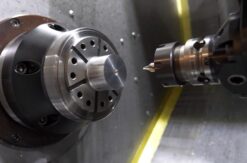SWMT: Your Partner in Advanced Manufacturing Solutions
Texas machine shops are experiencing a fundamental transformation as Industry 4.0 technologies reshape traditional manufacturing operations across the state. From precision aerospace components in the Dallas-Fort Worth corridor to oil and gas equipment manufacturing in Houston, Texas facilities are integrating smart sensors, connected machines, and advanced automation systems that dramatically improve productivity and competitive positioning.
According to Texas A&M University’s Manufacturing and Mechanical Engineering Technology program, Industry 4.0 encompasses automation technologies including sensing, robotics, smart manufacturing, and system integration that enable manufacturers to optimize processes and reduce downtime. The Federal Reserve Bank of Dallas documents that Texas businesses doubled their share of jobs associated with advanced technologies from five percent in 2012 to ten percent in 2022, with the Dallas-Fort Worth region seeing particularly strong growth from two percent to 4.5 percent during this period.
Understanding Industry 4.0 Technologies
Industry 4.0 represents the fourth industrial revolution, connecting physical manufacturing equipment with digital information systems to create intelligent production environments. For machine shops, this means CNC machines that communicate with scheduling software, quality systems providing immediate operator feedback, and predictive maintenance algorithms that anticipate equipment failures before causing downtime.
The National Institute of Standards and Technology’s Manufacturing Extension Partnership identifies several core technologies relevant to machine shop operations. The Internet of Things involves sensors continuously collecting operational data, providing visibility into machine utilization, tool wear, and process variations. Big data analytics transforms raw information into actionable insights, while artificial intelligence algorithms process sensor data in real time, automatically adjusting parameters to maintain quality.
Robotics extends beyond traditional industrial robots to include collaborative robots that work safely alongside human operators. These flexible automation solutions handle repetitive tasks like loading materials or removing finished parts, freeing skilled machinists to focus on programming and problem-solving. Cloud computing enables secure data storage and remote monitoring across multiple facility locations.
Strategic Implementation Approaches
Successful Industry 4.0 adoption requires identifying specific business problems that technology might solve—whether reducing setup times, improving inspection efficiency, or enhancing delivery reliability. This problem-focused approach ensures technology investments deliver measurable returns rather than becoming expensive experiments.
Assessment of current capabilities provides essential implementation context. Shops should evaluate existing IT infrastructure, workforce skills, and process documentation before selecting technologies. A facility lacking reliable internet connectivity should address network infrastructure before pursuing cloud-based systems. Shops with limited technical staff may need to build internal capabilities or partner with technology providers offering ongoing support.
Pilot projects offer lower-risk pathways to demonstrate value. Rather than attempting wholesale facility transformation, successful shops select one production cell for initial deployment. This focused approach allows learning on a smaller scale while generating success stories that build organizational confidence. Examining approaches outlined in How 5-Axis CNC Machining Transforms Complex Part Production for Texas Manufacturers provides valuable frameworks for technology deployment in specialized applications.
Key Technology Applications
Predictive maintenance represents one of the most valuable Industry 4.0 applications. Traditional preventive maintenance services equipment at fixed intervals regardless of condition, resulting in premature replacement or unexpected failures. Predictive systems monitor equipment continuously through vibration sensors, temperature measurements, and power tracking. Machine learning algorithms analyze these data streams to predict component failures, enabling maintenance during planned downtime.
Digital twin technology creates virtual representations of equipment or processes. Shops use digital twins to simulate machining operations before actual production, identifying potential issues without consuming materials or machine time. Digital twins also enable remote troubleshooting where experts examine virtual replicas to diagnose problems without facility visits.
Automated quality inspection systems employ machine vision and coordinate measuring machines to verify dimensional accuracy without manual measurement. These systems inspect parts faster and more consistently than human inspectors while generating comprehensive documentation automatically. Real-time quality data feeds back to machining processes, enabling automatic adjustments when measurements drift toward specification limits.
Manufacturing execution systems integrate production planning, work order management, and quality data collection into unified platforms. Operators receive digital work instructions specifying tools and parameters. Material requirements flow automatically to purchasing systems. This integration eliminates paperwork and provides real-time production visibility.
Regional Support Resources
Texas machine shops benefit from substantial support resources facilitating Industry 4.0 adoption. The state’s Manufacturing Extension Partnership centers provide consulting services, technology assessments, and implementation assistance designed for small and medium-sized manufacturers. MEP consultants work directly with shops to evaluate options, develop implementation roadmaps, and provide hands-on deployment support.
Texas universities conduct relevant research and offer workforce development programs. The Federal Reserve Bank of Dallas research demonstrates how Texas manufacturing workforce skills have evolved alongside technology adoption, with educational attainment rising significantly over the past decade. These academic partnerships provide access to emerging technologies and offer opportunities for student internships that help address workforce shortages.
Regional industry associations facilitate knowledge sharing among shops implementing similar technologies. Manufacturing councils host plant tours and technology showcases where shops share experiences and best practices. These collaborative networks help smaller operations access collective knowledge about vendors and implementation strategies.
Overcoming Implementation Challenges
Cybersecurity concerns grow as equipment connects to networks. Shops handling sensitive customer data must implement robust security measures protecting against ransomware and data breaches. Security strategies include network segmentation, regular software updates, employee training on phishing threats, and incident response plans. Shops should engage cybersecurity professionals for risk assessments rather than treating security as an afterthought.
Integration challenges arise when connecting new technologies with legacy equipment. Older machine tools may lack modern communication capabilities requiring retrofit sensors. Disparate software systems often resist integration, requiring custom interfaces. Shops should evaluate integration requirements during technology selection, favoring solutions supporting open standards.
Return on investment calculations sometimes prove challenging because benefits may be indirect. Improved decision-making, enhanced customer satisfaction, or increased employee engagement create real value that financial models struggle to capture. Shops should develop comprehensive business cases considering both tangible savings and strategic benefits like improved competitive positioning.
Change management requires organizational commitment beyond technology enthusiasm. Leaders must clearly communicate implementation plans and expected outcomes. Regular progress updates and celebration of milestones build credibility through inevitable difficulties accompanying organizational changes.
Measuring Success
Establishing clear metrics before implementation enables objective assessment. Shops should identify key performance indicators relevant to their business objectives—overall equipment effectiveness, on-time delivery, quality metrics, or manufacturing cost per part. Baseline measurements provide comparison points demonstrating actual improvements.
Continuous improvement methodologies complement Industry 4.0 technologies. Shops practicing lean manufacturing or Six Sigma can leverage technologies to accelerate problem identification. Real-time production data reveals waste and bottlenecks more quickly than manual observation. Understanding How Precision CNC Milling Drives Texas Manufacturing Growth and Competitiveness demonstrates how systematic approaches to precision manufacturing create sustainable competitive advantages that technology investments can amplify.
Successful shops view Industry 4.0 as an ongoing journey requiring sustained commitment and adaptation. Initial deployments reveal challenges and opportunities informing subsequent investments. Organizational skills grow through experience, enabling more ambitious projects over time. Technology vendors introduce improved solutions addressing earlier system limitations.
SWMT: Your Partner in Advanced Manufacturing Solutions
At Southwest Machine Technologies, we understand the challenges Texas machine shops face when implementing Industry 4.0 technologies. Our team provides comprehensive support throughout your digital transformation journey.
Our Services Include:
- Advanced CNC Machining Services – State-of-the-art equipment delivering precision manufacturing for aerospace, medical, and industrial applications
- Technology Integration Consulting – Expert guidance implementing smart manufacturing solutions tailored to your facility’s specific needs
Ready to Transform Your Operations? Contact SWMT to discuss how Industry 4.0 technologies can enhance your machine shop’s productivity, quality, and competitive position.
Works Cited
“Advanced Manufacturing Technology and Industry 4.0 Services.” National Institute of Standards and Technology, U.S. Department of Commerce, www.nist.gov/mep/advanced-manufacturing-technology-and-industry-40-services. Accessed 25 Oct. 2025.
“Manufacturing & Mechanical Engineering Technology.” Texas A&M University College of Engineering, engineering.tamu.edu/etid/research/mmet.html. Accessed 25 Oct. 2025.
Yücel, Mine K., et al. “Texas Economy Rides Wave of Changing Technology and Diffusion of Know-How.” Federal Reserve Bank of Dallas Southwest Economy, Second Quarter 2022, www.dallasfed.org/research/swe/2022/swe2204/swe2204c. Accessed 25 Oct. 2025.
Related Articles


